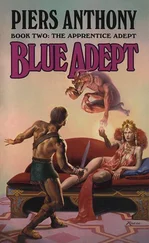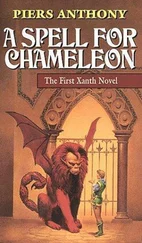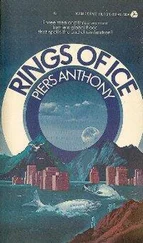“We have ascertained that this person is an alien creature occupying a human body,” the Minister of Alien Spheres said formally. “His Kirlian field is extremely intense, on the order of eighty times human normal, and its pattern is unlike anything we have on record. We believe he is what he claims to be: an envoy from a non-Sol Sphere.”
The Ministers of the Imperial Earth Council contemplated the subject. There was little to distinguish the alien. He was male, of normal height, about thirty years old, in good health. There were no telltale emanations from his eyes, extraordinary nuances of expression, or any visible aura. He was just an ordinary man—with a bright tattoo on his right wrist.
That tattoo was the mark of a recipient body: mindless, empty, without personality. Even without the Kirlian verification, the intelligent animation of this body was highly significant. Only a freak accident could have done it—or alien possession. For there was no known way to forge a Kirlian imprint, and Sphere Sol lacked the technology to transfer identity from one body to another.
The Regent of Earth Planet spoke next, formally addressing the possessed body. “Sir, we accept you as such an envoy, and accord you the courtesies of that office. Welcome to Sphere Sol. Please acquaint us with your mission.”
Now there was an almost tangible tension in the hall. Such visitations had been known only half a dozen times before in all human history, and each had had cataclysmic impact. One had confirmed the existence of intelligent alien life elsewhere in the galaxy, and revealed the presence of transfer technology. Another had defined the limits of direct human colonization—120 light-years’ radius from Sol—so that there would be no question of conflict with neighboring Spheres: Polaris, Nath, Canopus, Spica or giant Sador. Another, from neighbor Sphere Antares, had effected one fundamentally important exchange of technology: Sol had yielded the secret of controlled hydrogen fusion in return for Antares’ secret of matter transmission. That had revolutionized the human stellar empire, making rapid communication possible—and had presumably done something similar for Antares, starved for safe local power.
This could well be the moment of the century.
“I am Pnotl of Sphere Knyfh,” the alien said. “We are about five thousand of your light-years in toward the center of the galaxy. Our two Spheres have not before had direct contact.”
The Council Ministers nodded. They had only vague knowledge of the interior Spheres, most of whose stars of origin were not visible from Earth. But it was certain that many of them were highly advanced. In fact, Sol was a very new, very minor Sphere, a galactic backwater only now opening relations with its civilized contemporaries. Some Spheres had endured for thousands of years, and achieved radii of many hundreds of light-years, while Sol had achieved its full size only a century before.
“We place your locale,” the Regent said. “Please continue, Envoy of Knyfh.”
“I am embodied here to enlist the cooperation of Sphere Sol in a mutual crisis of galactic proportion. I ask you, at this moment, to ascertain which individuals of your sapient species are suitable for identity-pattern transfer.”
“That is not necessary,” the Minister of Alien Spheres said. “We maintain continuous survey. After the difficulty the first envoy had in making contact with our government, five hundred years ago—”
“That was not the first,” Pnotl said dryly.
“The first we recognized,” the Regent said, flushing. Historical research had revealed the probability of several prior attempts at transfer contact. All had failed because earlier cultures had preferred not to believe in the possibility of intelligent alien visitation or possession. What chances had been squandered by that ignorance!
“We felt we could not afford to risk any further such embarrassment,” the Minister of Alien Spheres continued. “So we maintain a number of potential transfer host bodies—such as the one you now occupy—and we have every Kirlian field on record.” He paused. “Unfortunately the technique of transfer itself has eluded us. We cannot transfer the mind of an individual of our species into another body.” He made a small gesture of apology, as though this were a minor matter. “We just don’t have the know-how.”
Pnotl turned on him a polite yet uncanny glance. “We grant it you,” the alien said.
It was as though a stun-bomb had detonated in their midst. There was now no pretense of unconcern. “The secret of the galaxy!” the Minister of Alien Spheres exclaimed.
The Regent held up one hand. “We cannot conceal our interest,” he said. “But such information is extremely valuable. We must know what you require in return, before we make any commitment.”
“What price?” the Minister of Technology rasped, almost drooling in his eagerness and apprehension.
That sobered the others. All eyes returned to the envoy. Surely the secret of the galaxy would exact the ransom of the millennium.
“No price,” Pnotl said evenly. “We wish you to have this capability.”
Now there was open suspicion. “Why?” the Regent asked.
“Our entire galaxy is in imminent danger. Unless we unify the Spheres and utilize our maximum capabilities, all of us may be destroyed. We have no other way to form a galactic coalition.”
“Forgive us for our cynicism,” the Regent said grimly. “We have a fable about Greeks bearing gifts. This means that we do not trust seemingly unmotivated largesse. And we are not likely to react to nebulous, undocumented threats.”
“And why us ?” the Minister of Alien Spheres demanded. “Sphere Sador has a radius of almost five hundred light-years—a volume of controlled space a hundred and twenty-five times as great as ours. They are the obvious candidate for your coalition.”
“Such cynicism is a survival trait,” Pnotl replied. “We are pleased to find it in you.” But something in his tone suggested that he was not delighted. “I shall satisfy you on three scores: the practical, the technological, and the intellectual.
“First, why not Sador, or Mintaka, or any of the other larger Spheres of this galactic segment? Because though well established, these Spheres are decadent. Their controlling species no longer possess the initiative to tackle a problem of galactic scope. And your other neighbors have not had the foresight to arrange for transfer hosts, as you have. We have therefore contacted the most capable Sphere in this region, Sol.”
The Council Ministers nodded, pleased at the unsubtle flattery.
“Technologically, I shall simply confer with your scientists immediately following this meeting, and will convey to them the details of the transfer mechanism. After all”—Pnotl paused to smile gravely—“if you do not achieve this capability in short order, I shall lose my own identity. I shall be the first transfer you make, since I cannot otherwise return to my Sphere.”
“Fair enough,” the Regent said, relieved that they would not have to undertake the enormous expense of mattermitting the envoy home. “If you trust the process enough to be the first subject, it would certainly seem to be authentic. But we can promise nothing until we know what the requirements are for membership in the galactic coalition.” He was still suspicious, and let the alien know it.
“To understand the need for cooperation, you must understand the nature of transfer itself,” Pnotl said. “Transfer is a modification of matter transmission, but such an unlikely aspect that only one species in a thousand discovers it independently.” The Minister of Technology nodded, remembering how devious the method of matter transmission had proved to be. A whole new system of logic had had to be mastered before the necessary computations could be made. But that logic had avoided the paradox of relativistic limitations, and allowed a particular type of signal to transmit across light-years without lapse of time. If identity transfer were worse than this, they would not master it soon, even with a full blueprint. The finest minds of the Empire had been trying for decades.
Читать дальше










